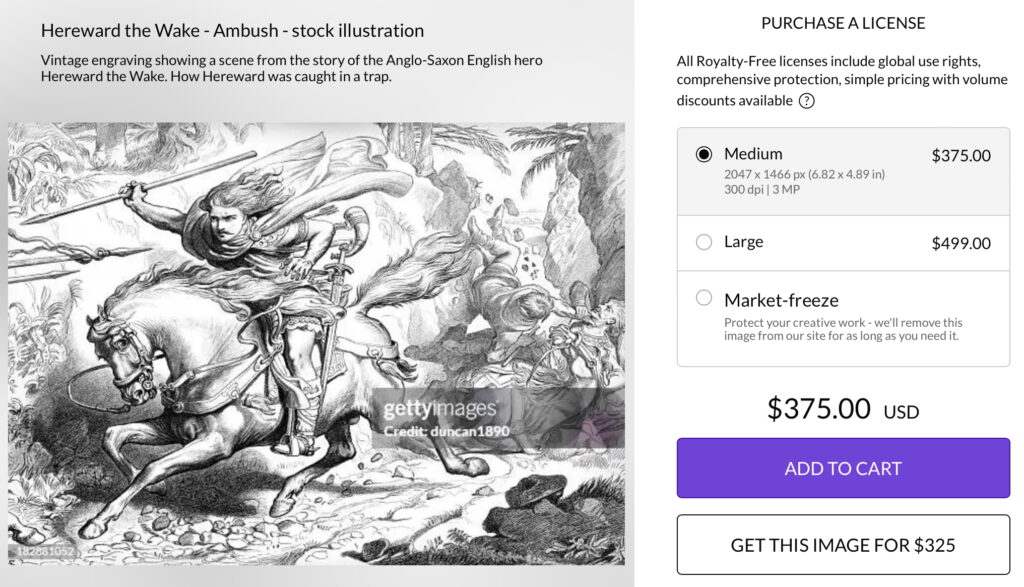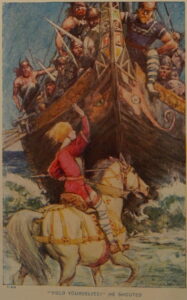I’ve been reading the Gesta Herwardi (“The Deeds of Herward” a.k.a. “Hereward the Wake”), one of the original outlaw stories from England (although it’s written not in English, but in Latin—because, no doubt, Everything Is Better With Latin!™). The Robin Hood collection from T.E.A.M.S. that I got last week includes a translation of Gesta Herwardi, but (a.) it’s abridged, and (b.) it’s a translation. (There’s no translation like no translation.) I found the Latin in a couple places at the Internet Archive and have been plowing though it. (The text that the Robin Hoods translated is at the end of this edition of Gaimar’s English Chronicle. A bilingual edition with an English translation by Henry Sweeting appeared serially in Fenland Notes and Queries.)
It’s pretty good so far. Herward, like young Grettir Stark, seems to have been a jagoff in his youth: partying at his parents’ expense, defeating everybody at sports in the most insulting way, quarrelling and fighting with everybody, until he finally gets kicked out and his adventures proper begin. He kills a terrifying bear, who is himself the son of a famous bear that had human hands and feet, could talk, and was wily in the ways of war. This Norwegian were-bear abducted a young woman who later gave birth to Beorn (“bear”), King of Norway. The bear that Herward fights is apparently the were-bear’s son by a different consort, because he’s all-bear but very large and savage.
Later Herward runs up against a giant warrior called Ulcus Ferreus, kind of a weird name. The ferreus is pretty straightforward: it means “(made of) iron”. But ulcus just means “sore” in Latin (coming into English as ulcer). I couldn’t believe there was a guy running around with the name “the Iron Sore”, so I looked up Sweeting’s translation to see if he offered any alternatives, but he just translates it as “Iron Sore”.
To my mind Ulcus is more likely a non-Latin name that’s had a Latin ending tacked on (which is how the writer treats most of the non-Latin names in their text, starting with Herward himself). I just can’t figure out what that name would be.
The guy in question is Scottish, and ulk might be a Celtic root, but those languages are closed doors to me, so I haven’t had any luck finding one that might fit here. I wanted the name to be something like Hulk, which has a nice comic-booky feel for a giant warrior, and hulcus is an Old English word, deriving from Medieval Latin hulcus (“a bulky ship that needs to be towed”). But I can’t figure out a reason for the initial h to be dropped, unless there were some proto-Cockneys running around northern Britain in the early Middle Ages.
The same Proto-Indo-European root that produces ulcus in Latin yields words meaning “rotten, stinking” in some Germanic languages. (Or maybe those are loans from Latin ulcus; sores do sometimes rot and stink, especially if the medical care is on the ancient/medieval level.) And ulk is a dialect word for “skunk” in Dutch., according to Wiktionary and the Etymologiebank at the Meertens Institute.
So I’m calling this guy “Iron Skunk” until forced by lawsuits or superior philology to do otherwise. Maybe Iron Skunk will pal around with Ratlick in an upcoming Morlock story.
Speaking of skunks: I was looking for an image or two of Herward to brighten up the dusty, skunky tedium of this post and I found quite a few public domain images. A lot of them had been watermarked by copyleft-thieves like Getty and Alamy, who will charge you a few hundred dollars for images that they don’t own and should not control. That stuff should be illegal.


